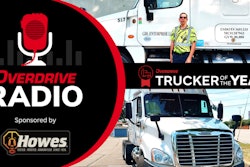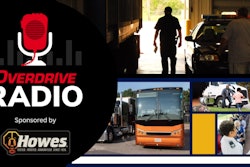Carrier Assure burst on the trucking scene a couple years ago promising to help vet carriers based on performance during a market boom. Two short years later, major brokerages won't tender a load without the go-ahead from Carrier Assure's metrics. The company also landed a major integration partnership with Truckstop's RMIS contracting/monitoring service for brokers.
Yet some carriers say that Carrier Assure grades fleets based on arbitrary criteria, even hearsay, locking them out of sometimes years-long relationships as brokerages adopt the tech tool.
Carriers also complain of a "pay to play" dynamic, claiming only Carrier Assure customers (largely brokers paying $149/month) can speak to the company about their scores, and that Carrier Assure gives an advantage to people who use Project 44 as a supply chain visibility/load tracking program, but not other similar services.
"The problem is we ... get a failing score with Carrier Assure because we do not have inspections," said Jim Land, owner of ZipLine Express, a small cargo van fleet in Missouri. "We run Sprinter-size vans that have GVWR below 10,001 lbs.," well under the weights roadside commercial motor vehicle inspectors focus on. "In fact, when we checked, in the state of Missouri, they will not perform inspections on these vehicles."

Land isn't the only carrier who gives Carrier Assure a failing grade.
John and Janet Northington, owners of Escargo Express LLC, another small Missouri cargo van fleet, wondered just how many other carriers met the same fate. "We have been characterized as a 'Bad Carrier' with an F grade by Carrier Assure, and they say we cannot be trusted with high-value cargo, complex shipments or long shipments due to the risk of missing appointment times, double brokering and/or taking freight hostage, simply because we do not show any safety inspections on our DOT authority or have any tracking history with Project 44," the couple wrote.
Escargo might be a "small mom and pop" carrier, but it's TSA-certified to enter airports, can work with clients tracking through MacroPoint or FourKites, and has proper insurance and no accidents, tickets or violations on the record.
"Carrier Assure is causing an negative impact on our ability to put food on the table due to their flawed vetting platform," said the Northingtons. "How many good carriers are being punished? How many truly bad carriers are slipping through just because they have inspections and a tracking history?"
Overdrive reporting has revealed that brokers increasingly rely on inspections data to vet carriers. Since Carrier Assure came online in 2022, double brokering, other types of freight fraud, and cargo theft through fraud have only increased, raising the hackles of now-more-vigilant brokers and carriers alike. But screening for inspections routinely misses not only cargo van fleets, but also dray and other operations that might infrequently cross scales.
Also, sometimes even double brokers get inspections.
[Related: FMCSA, police investigate double broker's odd inspections history]
At ZipLine, Land said his years-long relationship with BNSF's brokerage came to a screeching halt after J.B. Hunt bought the company and, he suspects, signed on to use Carrier Assure. That's $100,000 in annual revenue the company misses out on, putting them in dire financial straits.
Furthermore, ZipLine and Escargo claim that anyone can report a carrier to Carrier Assure for things like a bad address -- but that report might not be true, and carriers have to pay for membership to contact customer support and dispute it. (On the company's website, Carrier Assure offers only an email address -- [email protected] -- for carrier inquiries or disputes. "Due to staffing shortages, we cannot discuss the reports over the phone," the website notes.)
In March, ZipLine got the bad news from Hunt's carrier relations team. "We apologize for any inconvenience, but our matrix was created by our compliance and/or secuirty team to identify vetting criteria for onboarding and updating carriers," Hunt wrote to ZipLine. "The matrix does receive updates as we obtain more information and technology."
Three months later, the problem still hasn't resolved.
"Yes, it is a frustrating situation, we apologize for that. All we can suggest is that you check your account every few months to see if your status has changed, and make sure your account is up to date with the FMCSA," the Hunt carrier relations team concluded. "Unfortunately, you are not the only carrier affected by this."
[Related: How do you know you're working with a double broker? Increasingly, it's hard to tell]
A rep from Ryan Transportation Service put it plainly: "Currently your MC is F-rated in Carrier Assure. To load you, we would require you to be D- or higher-rated. If you have any questions about rating, you will need to reach out" to Carrier Assure directly.
Both ZipLine and Escargo reached out to Carrier Assure, and showed Overdrive records of a conversation with customer support -- that was months ago, and nothing came of it. A third carrier, ORD Expedite and Logistics, with nearly 100 trucks out of Illinois, said it contacted Carrier Assure customer support and got no information.
Land alleges that Facebook comments he makes on Carrier Assure's page get deleted in minutes.
Overdrive reached out to Carrier Assure CEO Cassandra Gaines directly, and though she initially agreed to an interview on Monday, she never got back with contract instructions or a time to speak. She has since not responded to questions from Overdrive about the allegations raised by ZipLine and Escargo.
Yet she's addressed potential negative impacts of her product's data-analysis approach to rating and vetting, via comments in response to one of her frequent LinkedIn posts, this one from last year.
"An owner-operator that had been in business for 11 years doing hotshot work had a D rating on Carrier Assure, when he's one of the most professional drivers I've ever worked with," wrote broker Schuyler Boyd, commenting on a LinkedIn post from Gaines. "Needs more data and more vetting, not an algorithm. Still a big fan of what you're doing, Cassandra, just not there yet for me to use as my go-to" for vetting.
"Thanks," she said. "Yeah, not the right platform for hotshot carriers. It's for OTR carriers."
Carrier Assure's website doesn't spell out that the platform intends only to grade OTR haulers. Talking to brokers and carriers, it appears Carrier Assure relies on data from FMCSA and other publicly available sources to generate its grades. On LinkedIn, Carrier Assure's page says it has between two and 10 employees.
Gaines, in another LinkedIn post, on Tuesday said that carriers can "receive free use of the platform to review all the information" to improve their scores, but Land said that just a few weeks ago he had to pay to look at his score.
Overdrive reached out to Truckstop about its RMIS system's partnership with Carrier Assure, and learned brokers had asked for the integration, but that it's entirely independent of Truckstop itself.
"At the request of our mutual broker customers, to streamline their workstreams and protect against fraud, Carrier Assure is integrated within RMIS for mutual customers to facilitate the use of Carrier Assure as another source to vet carrier data and information," a spokesperson said. "Carrier Assure is a separate service and entity from Truckstop RMIS and Truckstop has no influence on Carrier Assure’s carrier rating system."
As for how the two platforms work together, the spokesperson added, "Carrier Assure is available to brokers who subscribe directly with Carrier Assure and is available to brokers who are subscribers to RMIS. Carrier Assure is integrated within RMIS for mutual customers (both Truckstop RMIS and Carrier Assure customers) to facilitate the use of Carrier Assure as another source to vet carrier data and information."
Have you been given a bad grade by Carrier Assure or another vetting platform? What's your take on the rise of carrier-vetting tools like these? Reach out with your experience directly via email to Alex Lockie.
[Related: The third parties following you around the freight networks]









